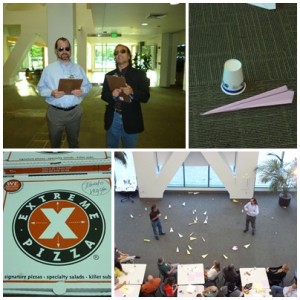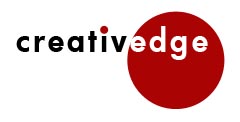Scrum masters and product owners know how hard it is to get their team to become high-performing. They can rest assured that they’re on the right track. Scrum helps teams become high-performing faster than other work methods. The reason is simple. Becoming high-performing is baked into the scrum recipe. In my experience coaching agile teams, I have observed over and over that teams that use scrum go from forming, storming, norming and ultimately to high-performing more quickly and reliably than teams that don’t. Here are five reasons why:
Read the full article…
Category Archives: coaching
Performance Review Pain Relief – The Agile Way
 Take a piece of yellow paper, a slice of pizza, and a couple of guys with clipboards – and what do you have?
Take a piece of yellow paper, a slice of pizza, and a couple of guys with clipboards – and what do you have?
Last week – it was the latest gathering of the North Bay Agile Meetup group. The topic was “Performance Review Pain Relief.” So what would you do with that piece of paper –- write a performance review –- or make an airplane? At this Meetup –- we did both.
Led by Chris Sims of Agile Learning Labs and Harold Shinsanto –- we formed agile teams of expert paper airplane manufacturers. And in the course of producing some of the most embarrassing paper airplanes in aeronautical history –- the group explored what works and doesn’t work with performance reviews.
Read the full article…
Training The Trainers
 Agile Learning Labs is partnering with Tobias Mayer to put on a brand new series of workshops aimed at trainers, coaches and advanced practitioners of Agile. We’re calling it Creative Edge: Training & Coaching for Coaches & Trainers. Catchy, eh? The Scrum Alliance is generously sponsoring the series, so there will naturally be special pricing for members.
Agile Learning Labs is partnering with Tobias Mayer to put on a brand new series of workshops aimed at trainers, coaches and advanced practitioners of Agile. We’re calling it Creative Edge: Training & Coaching for Coaches & Trainers. Catchy, eh? The Scrum Alliance is generously sponsoring the series, so there will naturally be special pricing for members.
Read the full article…
InfoQ: Agile Coach Camp Announced
Chris' most recent InfoQ article is a preview of Agile Coach Camp, billed as the Open Space conference "delivering value to those delivering value." The conference, which takes place in Durham, NC next month, is a bit different than most Agile gatherings, in that aspiring participants must "audition" for admission by submitting a position paper, guaranteeing a high level of professional discourse. Check out Chris' article for a preview of some of the topics proposed so far. Last year, Chris facilitated a couple of sessions, including one on What Makes Agile Projects Succeed.
Agile Games Par-tay! Yes siree…
 Think we don't know how to have fun here at Technical Management Institute Agile Learning Labs? Oh yes, we do! We're throwing a wild party on Wednesday, April 29th at Ristretto Roasters in Portland, OR with our pal and test obsessed training partner Elisabeth Hendrickson of Quality Tree Software. It's a warm-up for our day-long class May 1st for Agile coaches and consultants on how to create agile games, but it's also a stand-alone event. There will be coffee, pastries, and the opportunity to have some geeky fun playing Agile learning games with your compatriots. It's free, so come on down!
Think we don't know how to have fun here at Technical Management Institute Agile Learning Labs? Oh yes, we do! We're throwing a wild party on Wednesday, April 29th at Ristretto Roasters in Portland, OR with our pal and test obsessed training partner Elisabeth Hendrickson of Quality Tree Software. It's a warm-up for our day-long class May 1st for Agile coaches and consultants on how to create agile games, but it's also a stand-alone event. There will be coffee, pastries, and the opportunity to have some geeky fun playing Agile learning games with your compatriots. It's free, so come on down!
Read the full article…
Agile Coach Camp on InfoQ
What Makes Agile Teams Succeed (or Fail)? – Agile Coach Camp
Greetings,
This is the first of a two sessions that I facilitated at Agile Coach Camp. A small group of agile coaches, including Ron Jefferies came together on Saturday to consider the question “What makes agile teams succeed (or Fail)?” Using the Group Wisdom Without Groupthink process, we generated, discussed, and ranked about a dozen ideas.
IEEE Silicon Valley Technology Management Council – February Notes
At the February IEEE Silicon Valley Technology Management Council meeting the group did an exercise to generated practical suggestions for implementing four management ideals. The group broke up into 4 teams; each considered one management ideal, and then reported their suggestions for implementing the ideal back to the whole group. The whole exercise took 30 minutes and included networking as well as idea generation.
Here are my notes on the ideas that each team generated. Clarifications and additions are welcome!
Compliments – Positive Feedback
Compliments and criticism are the two edges of the feedback sword. Today, The Chief Happiness Officer’s Blog explains that to be effective, compliments must be specific. This generalizes well to ‘feedback must be specific’. In particular, you want to clearly describe the behavior that you observed. For instance: “Bob, I see that while you were fixing that bug you also added several new tests and refactored the module.” Now that Bob knows exactly what you are going to compliment him on, tell him about the impact this will have: “That will really make it easier for people to work in that module in the future, and probably prevent some bugs too!” At this point, if we were delivering criticism, we would request a change in behavior. Since we are giving a compliment, we can simply say thank you: “I really appreciate you doing that. Thanks.”
You can find more on feedback here.
A Different Kind of Tolerance in the Workplace
Dannyman pointed out this quote from William L. McKnight, past Chairman of the Board at 3M.
As our business grows, it becomes increasingly necessary to delegate responsibility and to encourage men and women to exercise their initiative. This requires considerable tolerance. Those men and women, to whom we delegate authority and responsibility, if they are good people, are going to want to do their jobs in their own way. Mistakes will be made. But if a person is essentially right, the mistakes he or she makes are not as serious in the long run as the mistakes management will make if it undertakes to tell those in authority exactly how they must do their jobs. Management that is destructively critical when mistakes are made kills initiative. And it’s essential that we have many people with initiative if we are to continue to grow.
